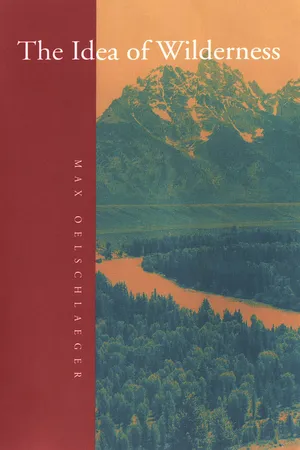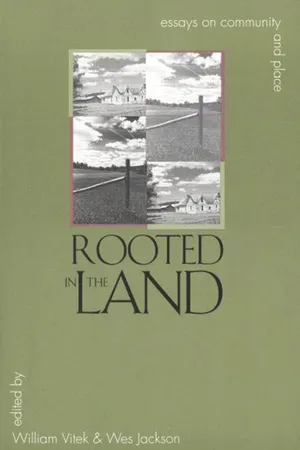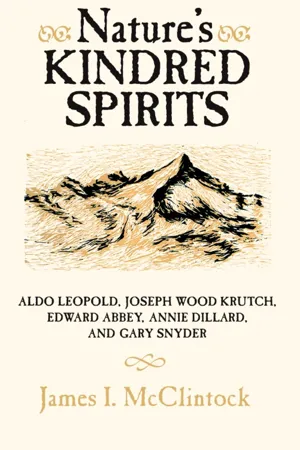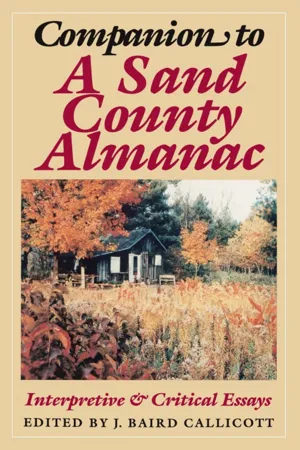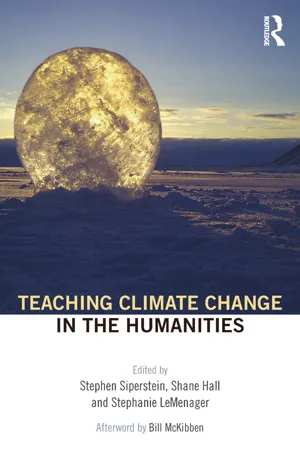Politics & International Relations
Aldo Leopold
Aldo Leopold was an influential American conservationist, forester, and environmental philosopher. He is best known for his book "A Sand County Almanac," which has had a significant impact on the environmental movement. Leopold's concept of a "land ethic" emphasized the interconnectedness of humans and the natural world, advocating for responsible stewardship of the environment.
Written by Perlego with AI-assistance
Related key terms
1 of 5
5 Key excerpts on "Aldo Leopold"
- eBook - PDF
- Vera Schwarcz(Author)
- 1998(Publication Date)
- Yale University Press(Publisher)
Yet Leopold's thinking transcends such criticism. First, he was criticizing his critics for being Utopian and defending his plan as a real-istic means to achieve a difficult end. Although Leopold's language was popular (by design), his words reflect a keen ecological insight—namely, that humankind was related to nature not externally but internally. What people did, regardless of their motives, had effects that rippled through-out culture and nature, destroying both the environment and blighting human lives. A narrowness of economic vision (itself predicated on Mod-ernism) lay at the root of both evils. Yet there was a potential solution, for humans possessed a residual love of nature that might spark a re-fashioning of liberal-democratic life. Leopold was here abandoning the Baconian-Cartesian dream of dominating nature and Adam Smith's politi-cal economy. The human economy was not one of action at a distance, zi 8 Aldo Leopold where mere matter-in-motion was transformed into the goods to sustain a consumers culture, but action that immediately affected the living world, and thus human beings: nature's economy and the human economy were intrinsically, intimately linked. In 1933 Leopold published two pivotal works: Game Management and The Conservation Ethic. Game Management, along with Herbert Stod-dard's The Bobwhite Quail, virtually created a profession, giving game management a shape and texture that remain today. One writer cites Game Management, along with the National Environmental Policy Act (1969) and the Endangered Species Act (1973), as milestones in the evolution of America's conservation history. 36 Game Management outlined a core conception of ecological science that endured for Leopold's professional life, anticipating the transdisciplinary position he later advanced in Sand County Almanac, and it touched now and again on fundamental ques-tions of human nature and ethical behavior. - eBook - PDF
Rooted in the Land
Essays on Community and Place
- William Vitek, Wes Jackson(Authors)
- 2008(Publication Date)
- Yale University Press(Publisher)
Aldo Leopold and the values of the native g r e g o r y c o o p e r becoming native to this place, to borrow Wes Jackson’s useful phrase, is a mat-ter of recognizing dual citizenship. It involves the realization that one lives in the midst of a human and an ecological community, and the successful native man-ages to integrate into both.This essay explores the following question:What kinds of values would we expect the successful native to embody? In the process, I pro-pose to take Aldo Leopold as my exemplary native. There are several reasons for choosing Leopold. He was the first to explicitly advocate recognition of this dual citizenship. Furthermore, he remains today, despite fifty years of concerted effort to advance the debate, one of the clearest voices among the cacophony calling for an elevation of environmental consciousness. Again, Leopold realized that the most crucial, and in many ways the most problematic, environmental issues in-volve local land-use decisions among the private sector—decisionmaking “on the back forty,”as he liked to call it. This emphasis on the local scene is important for our purposes because, as Jackson’s phrase emphasizes, the native becomes native to this place,to a specific and concrete mix of human and ecological circumstances. Finally, Leopold had an uncanny knack for settling in, for distilling patterns in land-use practices and their relations to the ecological fundamentals of a land-scape, whether the wild American Southwest or the dairy country of southern Wisconsin. Let us begin, then, with the human community.What kinds of value com-mitments might integration into the human community involve? We see at once that this is a huge question, and that to a significant degree it is synonymous with one that philosophers have pursued for millennia: What is the nature of the ethi-cal life? Not surprisingly, Leopold, a forester and wildlife biologist by trade, is of little help here. - eBook - PDF
Nature's Kindred Spirits
Aldo Leopold, Joseph Wood Krutch, Edward Abbey, Annie Dillard, and Gary Snyder
- James I. McClintock(Author)
- 1994(Publication Date)
- University of Wisconsin Press(Publisher)
2 AIda Leopold: Mythmaker Animal and vegetable life is too complicated a problem for human intelligence to solve, and we can never know how wide a circle of disturbance we produce in the harmonies of nature when we throw the smallest pebble into the ocean of organic life. -George Perkins Marsh (1864) We are still in Eden; the wall that shuts us out of the garden is our own ignorance and folly. - Thomas Cole (1835) Aldo Leopold was born in Burlington, Iowa, in 1877, the year when two brothers shooting at Muskego Lake, Wisconsin, "bagged 210 blue-winged teal in one day" and a dozen years before "the last passenger pigeon collided with a charge of shot near Babcock" (SCA, 15, 13). Leopold would become one of the century's foremost conservationists and author of the environ- mental classic A Sand County Almanac. Educated at the Yale School of Forestry, which had been endowed by the Pinchot family, Leopold joined the United States Forest Service, then headed by Gifford Pinchot, Teddy Roosevelt's chief forester and the nation's most prominent conservationist. Under Pin- chot, conservation [was] development, the use of the natural resources now existing on this continent for the benefit of the people who live here now."l Beginning in 1909, Leopold spent fifteen years in New Mexico and Arizona managing millions of board feet of timber and making policy for public land use by cattle and sheep ranchers. But by 1915 he had become so concerned about game depletion in the Southwest that he, an avid hunter, shifted from a preoccupation with forestry toward the protection of game. As a leader of the fledgling New Mexico game protection 23 24 AIda Leopold: Mythmaker movement, he learned more about relations between game de- pletion and deteriorating habitat. One result of his growing awareness of environmental degradation was his important recommendation that a half million acres in Gila National For- est be preserved as roadless wilderness. - eBook - PDF
Companion to A Sand County Almanac
Interpretive and Critical Essays
- J. Baird Callicott(Author)
- 1987(Publication Date)
- University of Wisconsin Press(Publisher)
The lunch-bucket argument, and the deification of greed as the American Way, reelected by a landslide one of the The Legacy of AIdo Leopold most antienvironmental presidents in our history. AIdo Leopold would not be encouraged. There will always be those who believe that the Public Do- main is owned and maintained by the rest of us for their ex- elusive exploitation and use. There will always be those who never breathed deeply of the wind off elean grassland, or enjoyed the shade of a hillside oak on a July day, or watched with pleasure as some wild thing slid out of sight, and who will never see the reasons for living with the earth instead of against it. The number of functional illiterates that our free public educa- tion produces does not make us sanguine about educating a ma- jority of the public to respect for the earth, a harder form of lit- eracy. Leopold's land ethic is not a fact but a task. Like old age, it is nothing to be overly optimistic about. But consider the alternative. Notes I. Mary Austin, The Land of Little Rain (Boston: Houghton Miffiin, 1903), 88. 2. Henry David Thoreau, The Writings of Henry David Thoreau, vol. 9 (Boston: Riverside, 1983), 275. 24-5 12 * Duties to Ecosystems H 0 L M E S R 0 L S TON, I I I "A thing is right when it tends to preserve the integrity, stability, and beauty of the biotic community. It is wrong when it tends otherwise" (224- 25). "That land is a community is the basic concept of ecology, but that land is to be loved and respected is an extension of ethics" (viii-ix). "The plant formation is an organic unit . . . a complex orga- nism." 1 So Frederic Clements, a founder of ecology, concluded from his studies in the Nebraska grasslands. Henry Gleason, a botanist of equal rank, protested, "Far from being an organism, an association is merely the fortuitous juxtaposition of plants." 2 Leopold takes a middle route between these extremes. - eBook - ePub
- Stephen Siperstein, Shane Hall, Stephanie LeMenager, Stephen Siperstein, Shane Hall, Stephanie LeMenager(Authors)
- 2016(Publication Date)
- Routledge(Publisher)
Environmental ethicists have been slow to address climate change in large part because climate change has radically expanded the spatial and temporal scales that have framed the field from its inception. When academic environmental ethics emerged in the 1970s, it was scientifically informed primarily by evolutionary biology and ecology and has been scaled accordingly. Aldo Leopold, the most influential precursor of academic environmental ethics, famously urged us to “think like a mountain.” In his day, that was thinking big. When he turned that phrase in the mid-1940s, Leopold was making a plea on behalf of big, fierce predators— which coevolved with their prey to the mutual benefit of such interrelated species. He notes that a buck pulled down by wolves can be replaced (through reproduction) in three years, but a range, over-eaten by deer, will take as many decades to recover (through ecological succession). The temporal difference between deer reproduction and range recovery is a neat order of magnitude. Now, however, we must think like a planet, and that requires us to think in temporal terms of at least another order of magnitude more. And the spatial scale of global climate change is, well, global. And how many mountains are there on the globe? Therefore, existing environmental ethics—such as the Aldo Leopold land ethic, focused on the integrity, stability, and beauty of biotic communities—cannot simply be scaled up to address climate change ethically. Further, the sciences informing climate ethics are biogeochemistry and Earth systems science. So environmental philosophers have to come up to speed in these sciences, as they once had to do in evolutionary biology and ecology. And that’s no easy task.Thus the first thing will be teaching the basics of climate science: greenhouse gases; rising average global temperature; heat-expansion of seawater + melting glaciers and Arctic and Antarctic sea ice = rising sea level; acidification (carbonic acid) of the oceans and the impact of a downward pH shift on shellfish; increase in the frequency and violence of storms, floods, droughts, northward migration of tropical pathogens. The most general characterization of the phenomenon is not “global warming” but a shift to a more energetic planet. This initial part of the course is not science—no advanced mathematics, no modeling software—but science literacy, a humanities.
Index pages curate the most relevant extracts from our library of academic textbooks. They’ve been created using an in-house natural language model (NLM), each adding context and meaning to key research topics.
